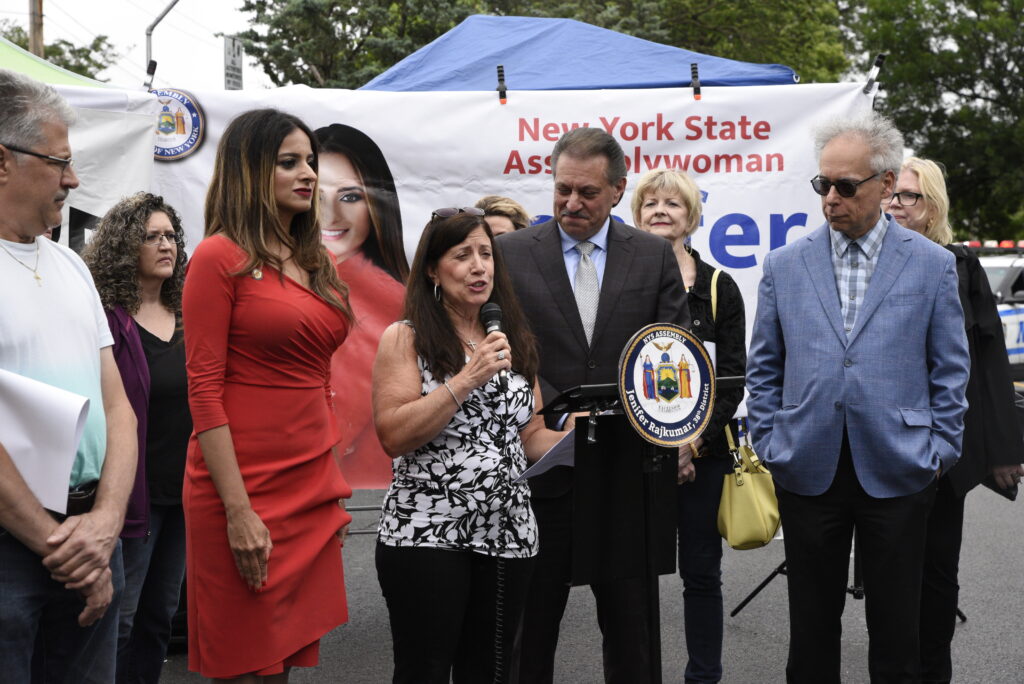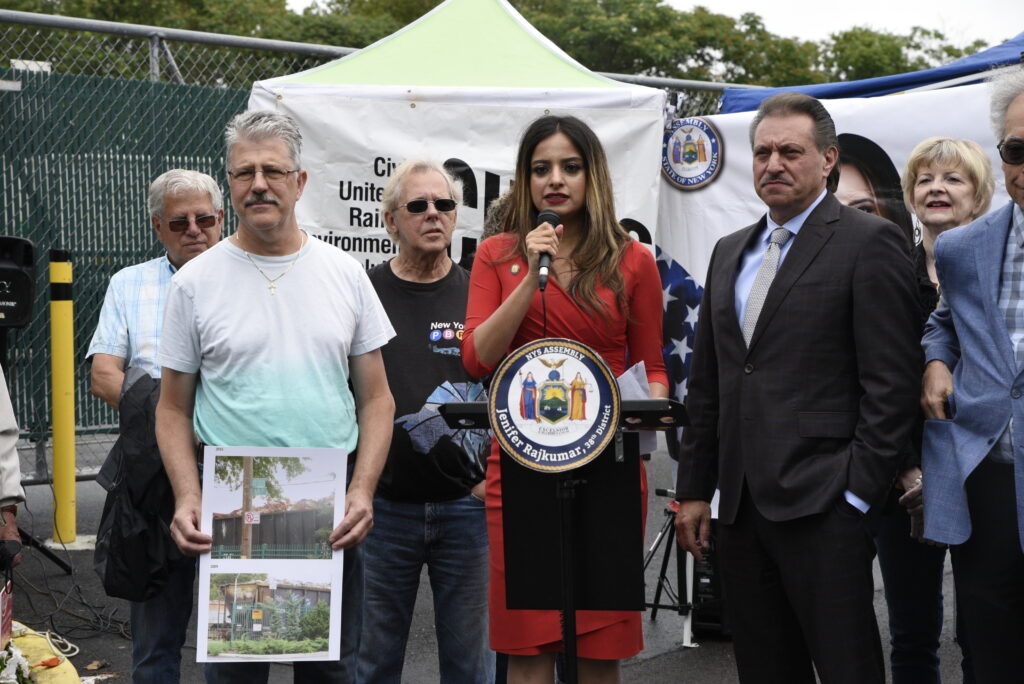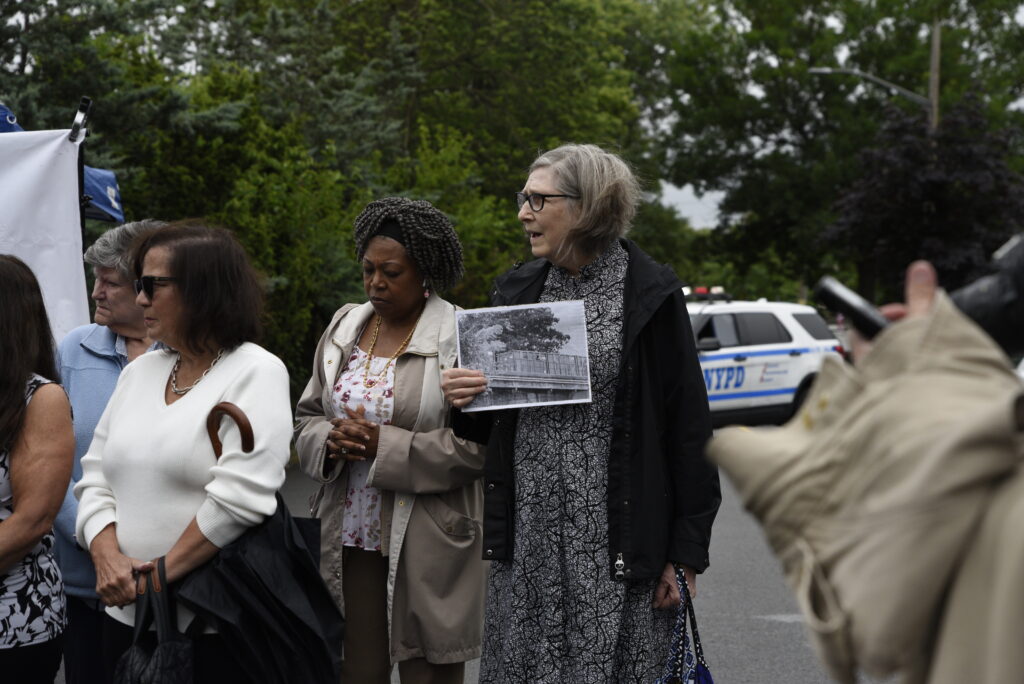
The founder of the Civics United for Railroad Environmental Solutions celebrated the victory at the press conference. Photo by Iryna Shkurhan.
By Iryna Shkurhan | ishkurhan@queensledger.com
In a victory for local residents who reside by train tracks, a bill requiring waste being transported by rail to be covered passed in both the state senate and assembly.
The bill, which Glendale residents have been advocating for over a decade, will end the transport of uncovered waste which emits an odor that one resident described as “beyond disgusting.” Train cars will need to be covered by sealed lids or hard tarping to prevent noxious gas emissions and spillage into the community.
“It’s time to put a lid on the garbage to put a lid on the noxious fumes, to put a lid on the hazardous waste. It’s time to put a lid on the destruction of our health, to put a lid on the destruction of our environment,” said Assemblywoman Jenifer Rajkumar, at the celebratory press conference outside the New York and Atlantic Railroad Company tracks in Glendale on June 23. “Just put a lid on it. It is common sense.”
Currently, only a porous mesh tarp covers some of the train cars which allows the odor to roam to nearby homes as trains sit idling. And when it rains, the exposed rainwater seeps through the waste, comes out through drains in the bottoms of cars and leaks into nearby streets and storm drains.
Waste is one of New York’s biggest exports by rail, yet no regulations on containerizing it currently exist. The industry is also currently expanding by 35% every year.

Assemblywoman Rajkumar secured unanimous support for the bill in Albany. Photo by Iryna Shkurhan
In past years, the bill either passed in the senate or in the assembly, but never both simultaneously for it to be enacted. For the first time it passed in both, with the partnership of State Senator Joe Addabbo and Assemblywoman Rajkumar.
“We did this for the people of Glendale, Ridgewood, Maspeth and Middle Village who need this legislation to protect their health and welfare,” said Rajkumar, who sponsored the bill and secured a unanimous passage. “This was an enormous victory for our community.”
The Assemblywoman also shared that her constituents in central Queens would frequently complain about unbearable odors that make it difficult to enjoy their outdoor spaces and evolve fears of health issues. Even students at Christ the King High School would complain of headaches and nausea from the waste odor. At monthly Community Board 5 meetings, her representatives would update constituents on the bill’s progress.
Mary Parisen Lavelle, a former Glendale resident, started the Civics United for Railroad Environmental Solutions organization in her kitchen after being fed up with the odor and noise from waste transporting trains. She says that she spent countless hours creating spreadsheets, and conducting the necessary research, to determine which elected officials had the power to fix the issue.
“And it has been long overdue to have this issue addressed,” said Lavelle, current CURES President at the press conference. “It’s an environmental issue and a quality of life issue.”

Mary Arnold, cofounder of CURES, said she is fighting for a healthier community for her family. Photo by Iryna Shkurhan.
For CURES, the next step is dealing with the noise pollution that wakes residents up at night and rattles homes near the tracks. Several residents said that the outdated trains tend to idle for hours past midnight.
“Legislators all across this state, even the upstate regions have said that this will be transformative for their districts,” said Rajkumar, pointing out that this issue also exists in other corners of the state.
The bill is now headed to Governor Kathy Hochul’s desk for consideration.
“I love this bill, because it was born from our constituents,” said Addabbo at the press conference. “Here we are on the cusp of really making an impact for our people. A direct result of constituents complaining.”


